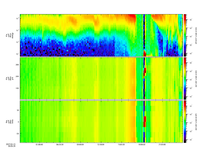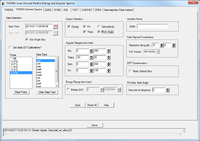THEMIS Particle Spectrograms

Angular and energy spectrograms can be produced from THEMIS ESA and SST particle data. Spectrograms (or spectra) are produced after selecting a spacecraft, data type, and time range. The data are then averaged across the non-selected dimensions and plotted across time. Magnetic field aligned spectra can also be generated.
For command line usage see:
SPEDAS Plugin

Particle spectrograms can be created from the SPEDAS GUI.
From the File menu select Load Data then select the THEMIS Derived Spectra tab. Most parameters can be edited from this interface, however some remain command line only. Multiple probes and data types may be selected. All selected output types will be created for each probe/datatype combination. Required support data will be loaded automatically.
Basic Spectrograms
These spectra are created by averaging the data in the native DSL coordinates.
Energy
The data are averaged across all look directions to create an omni-directional energy spectrogram. The plot's y axis is energy.
Phi
The data are averaged across energy and theta (latitude - measured from the spacecraft's spin plane to spin axis) to create an azimuthal spectrogram. The plot's y axis is phi (longitude).
Theta
The data are average across energy and phi (longitude - measured along the spacecraft's spin plane) to create a latitudinal spectrogram. The plot's y axis is theta (latitude).
Field Aligned Spectrograms
Field aligned spectra are produced by first transforming the data into magnetic field aligned coordinates. Field aligned coordinates always use the magnetic field as their z axis. The direction of x and y depend on the particular variant. After the data is transformed into the new coordinates it is interpolated onto a regular grid. The resolution of that grid may be specified.
Gyrophase
The data are transformed into magnetic field aligned coordinates then averaged across all energies and latitudes to create a field aligned azimuthal spectrogram.
Pitch Angle
The data are transformed into magnetic field aligned coordinates then averaged across all energies and longitudes to create a field aligned colatitudinal spectrogram.